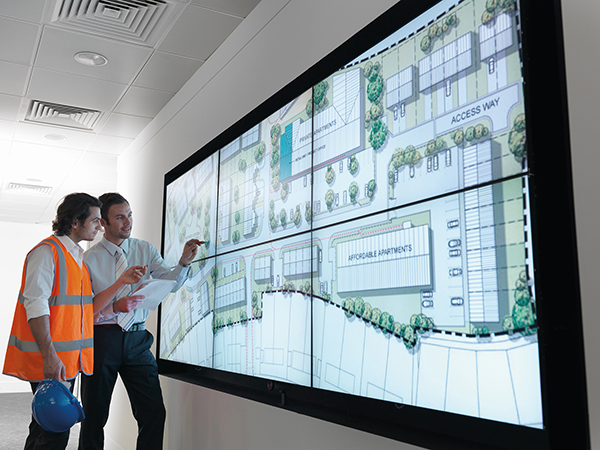
Job profile
Site manager (m/f/d)
Site managers are the linchpin of any construction project, from inception to completion. They don the hat of a coordinator, ensuring swift and accurate construction of buildings. Their role involves synchronizing teams, providing precise instructions to employees, and overseeing the performance of external partners and suppliers.
Keeping a vigilant eye on the economic, structural, and time aspects of the project, site managers ensure smooth operations on construction sites. They are entrusted with the responsibility of implementing customer requests accurately. The final quality control is also under their purview, where they assess if the construction work aligns with the required quality standards and if all tasks have been executed correctly.
Seeking a site manager role (m/f/d)?
If you answered ‘yes’ to these questions, then we have the perfect opportunities for you. Join us and bring your expertise to our diverse projects.
In search of a qualified site manager (m/f/d)?
Seeking an exciting role as a site manager (m/f/d)?
What Does a site manager do?
In addition to their on-site responsibilities, site managers also perform office duties, including preparatory and follow-up work, project management, negotiations with stakeholders and suppliers, and carrying out calculations. Their role often parallels that of project managers due to the similarity in management tasks.
The role of a site manager can sometimes be demanding, leading to a challenging work-life balance. This is particularly true when project plans deviate from the original path, requiring swift responses and contingency plans. Such situations call for the site manager’s expertise, routine, and composure to ensure timely completion of construction.
As a site manager, you’ll interact with various individuals on the construction site, sponsors, and external companies. This role demands strong communication skills and a keen understanding of human nature. It’s crucial to involve the right people at each phase of the construction plan and to maintain a comprehensive understanding of all on-site information.
Site manager salary in Switzerland: AN in depth analysis
The average annual gross salary for site managers in Switzerland stands at CHF 89’477.00. However, a construction manager’s compensation is influenced by various factors such as geographical location, professional experience, and the size of the employing company.
In terms of regional differences, site managers earn the highest salaries in Ticino, while Glarus offers the lowest compensation. The Swiss construction industry is known for its comparatively high wages, offering the highest minimum wages and craftsmen salaries.

Starting salary as a site manager: Junior site manager salary in Switzerland
CHF 80’000.00. As professional experience increases, so does the salary.

Senior site manager salary in Switzerland: your earnings after many years
Site manager ROLES AND RESPONSIBILITIES: A COMPREHENSIVE GUIDE
Key responsibilities of site managers include:
- Monitoring and controlling the construction site
- Observing specifications in the building permit, plans and other regulations
- Checking the proper implementation of the construction work
- Completing construction site tours
- Developing workflows and improving processes
- Obtaining cost estimates and offers from service providers
- Conducting negotiations and agreements with clients
- Planning staff deployment
- Accepting services and deliveries
- Taking over cost control and invoice verification
- Participating in official inspections
- Complying with health and safety guidelines

Junior site manager tasks
At the onset of their career in site management, junior site managers support more experienced individuals in construction management.
Their tasks include:
- Quality control of the work carried out
- Administrative tasks, such as checking invoices
- Documentation of the construction
- Serving as a contact person for clients and service providers
- Assisting the senior site manager
Senior site manager tasks
With their expertise, long-serving senior site managers often transition into a managerial role. In addition to their management role, their tasks mirror those of site managers:
- Planning of construction projects
- Organization and coordination of the parties involved
- Consultation with clients
- Cost calculations
- Monitoring compliance with site-specific regulations
- Documentation of the construction progress
- Checking the quality
UNDERSTANDING THE ROLE OF A SPECIALIST SITE MANAGER
The specialist site manager is responsible for organizing and ensuring compliance with regulations within their area of expertise. They provide support to the site manager in a specific domain, while the site manager continues to be the primary point of contact for the construction project. Once the tasks within the specialist area are completed to satisfaction, the role of the specialist site manager concludes.
HOW TO BECOME A SITE MANAGER? training, studies & further education
Most aspiring site managers in Switzerland undertake the Higher Professional Examination (HFP) to specialize in building construction or civil engineering. There are recommended courses or preparatory programs to help candidates successfully pass this exam.
Alternatively, a degree course can provide a direct pathway to becoming a construction manager. This could be a bachelor’s or master’s degree in fields such as civil engineering or architecture. Practical experience gained through internships complements the academic knowledge, equipping candidates with the necessary skills for the role.
Training for site managers: Aiming for the higher professional examination
In Switzerland, to earn the protected title of “Certified Construction Manager in Civil Engineering”, one must successfully complete the Higher Professional Examination in Engineering and Architecture (HFP). Currently, around 2’300 construction managers in Switzerland hold this esteemed title.
While there’s no traditional training pathway to become a site manager, the journey to passing the HFP typically involves a preparatory course or a dedicated program at a vocational college. These courses usually span between four and six semesters. The HFP is overseen by the State Secretariat for Education, Research and Innovation (SERI).
To be eligible for the exam, candidates need a Federal Certificate of Proficiency (EFZ) in architecture, civil engineering, or as a technical draftsman, along with at least five years of professional experience as a site manager. Alternatively, a degree from a university of applied sciences or university, coupled with an additional six years of professional experience as a site manager, is also acceptable.
For those interested, special training programs are available in preparation for the HFP, such as those offered at the Sursee campus.
Academic pathway to construction management: a comprehensive guide
- Civil engineering
- Architecture
- Water and soil management
- Building technology

For experienced female architects holding a bachelor’s or master’s degree, a supplementary master’s course in “Construction Management” is a suitable option. This course is offered at institutions such as the University of Applied Sciences Northwestern Switzerland.
It’s important to note that practical experience is crucial in this field. Many students undertake internships on construction sites during their studies to gain the necessary hands-on experience. After all, practical experience is a key component in becoming a successful construction manager.
Continuing education for site managers
- Project management (construction)
- Seminars on specific materials
- Acting with legal certainty in construction management
- Specialist engineer modules
- Construction logistics planning

Lateral entry into construction management
essential skills for Construction managers
- Sound knowledge of mathematics and statistics
- Knowledge of statics, timber construction, CAD planning and construction IT
- Advanced know-how in relevant technologies
- Proficiency in building informatics
- Analytical thinking
- Teamwork
- Assertiveness
- Strong negotiating and communication skills
- A strong sense of responsibility
career opportunities for Construction managers in Switzerland
The construction industry in Switzerland, contributing to 5% of the GDP, is a robust sector. The growing population necessitates the creation of more living spaces. Despite a minor dip in orders, the industry remains resilient and robust. Switzerland was able to swiftly mitigate the less severe impacts of the pandemic on the construction industry.
However, the industry faces intriguing challenges in Switzerland due to a shortage of skilled workers and materials.
The career prospects for construction managers are promising there’s a high demand for qualified personnel. To gain a competitive edge, further training in the digital sector or sustainable construction is recommended. After all, innovation is highly encouraged - even in construction.
Despite a slight decrease in orders, the unemployment rate in the construction industry is low at 3.4%, indicating a positive employment situation.

Top Vacancies for site managers (m/f/d)
FAQ
Our business model
Our locations

